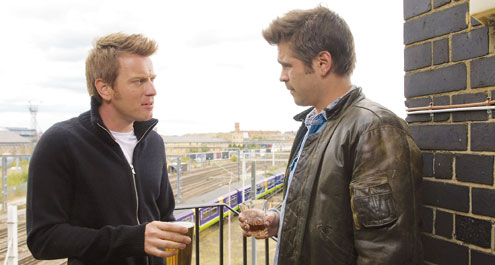
So, since the statute of limitations is running out on this one, and since I now have a backlog of films to write about (including two involving Colin Farrell wracked by conscience): Woody Allen’s surprisingly pedestrian Cassandra’s Dream, which I caught two weekends ago, is definitely a swing and a miss. It’s true that I’ve been Netflixing Allen’s better films – Crimes and Misdemeanors, Husbands and Wives, Manhattan — of late, so I might be holding Allen to a higher standard than Scoop, say, should deem appropriate. But even Allen’s most recent drama, Match Point, far outshines the tale of familial woe on display here. Ewan MacGregor is always an appealing actor, and Colin Farrell and Tom Wilkinson are no slouches either, but they can’t spin gold from the overheated, overwritten script Allen has dealt them this time. If you see one recent movie about desperate brothers getting in over their heads on the wrong side of the law, see Before the Devil Knows You’re Dead. If that movie was a return to form for Sidney Lumet, Cassandra, unfortunately, goes down on the debit side of the ledger for the Woodster.
As Dream begins, two working-class English brothers, ambitious restauranteur Ian (MacGregor) and amiable mechanic Terry (Farrell), contemplate pooling their very limited resources to buy a small sailboat. The vessel, unfortunately for them, is named Cassandra’s Dream (I guess Polyanna’s Reverie had already sailed), and its dour apellation is the first of many harbingers of doom for these two Cockney lads. But buy the boat they do, thanks to an infusion of gambling winnings for Terry, who’s enjoying a sterling lucky streak at the races of late. But, the problem with gambling, as everyone knows, is eventually you lose. And, after a particularly bad night of cards, Terry finds himself down 90,000 quid and in a good spot of trouble. (Perhaps he should’ve listened to the veritable Greek chorus of supporting cast, who continually remind us that Things Go Wrong.) Ian, meanwhile, is sick of the family business, and also needs money in the worst way, both to get in on a potentially lucrative investment deal involving California hotels and to woo a beautiful, wanton, and clearly high-maintenance actress (newcomer Hayley Atwell) he met-cute one day in the countryside. And so, since family is family and blood is blood and all that, the two brothers go hat-in-hand to their supremely wealthy uncle (Wilkinson), a world-traveling plastic surgeon/industrialist of some sort. Uncle Howard is happy to help, but he wants a pound of flesh for his contribution, namely the head of a business associate who threatens to rat out his financial indiscretions to the powers-that-be. Will Ian and Terry put their very souls at risk for the lure of some quick, blood-tainted cash? Wouldn’t be much of a movie if they didn’t, now, would it?
Given the title and the constant, over-the-top foreshadowing of grim events to come, it seems clear Allen was trying to tell a modern-day version of the ancient Greek family tragedy (a la Mystic River, which gave the sense its main characters’ fates along the wine-dark Charles were decided for them decades before, as children.) But, while Fate in Cassandra may be inexorable, it’s sadly not all that interesting. The brothers spend the middle third of the film agonizing over a choice we already know they’re going to make, and the final third repeats this process all over again. (The ending, which I will not give away, is a particularly goofy contrivance.) Plus, the many wheezy monologues about doom foretold and family bonds seem even more stilted by the fact that Allen is clearly out of his element. These sorts of meditations seemed more natural when delivered by the anxious and overanalytic New York intellectuals of Crimes and Misdemeanors. After all, that’s Woody’s wheelhouse. But, simply put, working-class London is not Allen’s forte. Perhaps the only actor who comes off convincingly here is Sally Hawkins, as Terry’s kind, long-suffering girlfriend. While MacGregor and Farrell seem a mite confused by Cassandra‘s stiff formalism, she’s the only actor here who manages to seem an honest-to-goodness human being, and thus the one character who manages to put the sting of tragedy in Allen’s otherwise forgettable tale.

